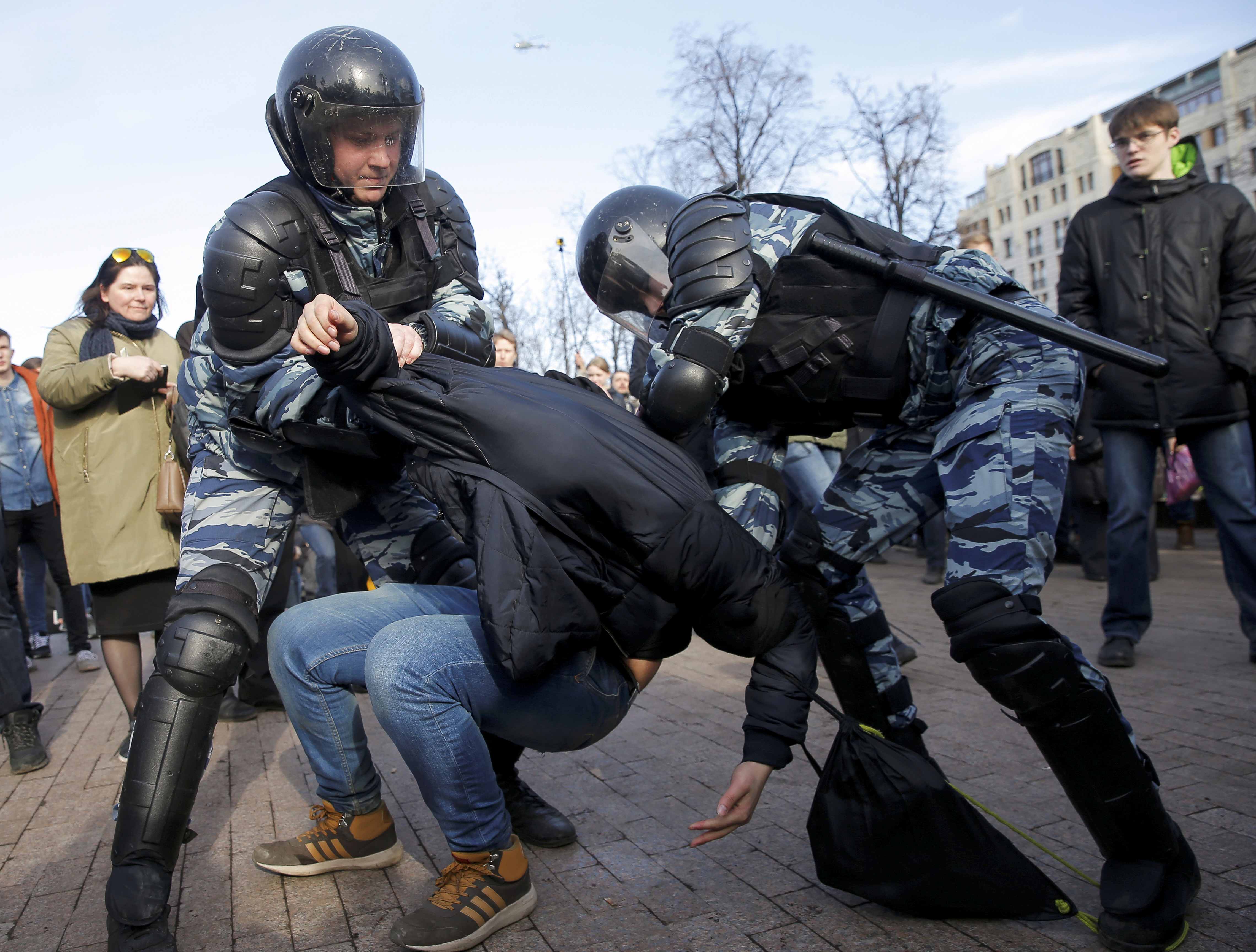
By Denis Pinchuk and Svetlana Reiter
MOSCOW (Reuters) – Protests across Russia on Sunday marked the coming of age of a new adversary for the Kremlin: a generation of young people driven not by the need for stability that preoccupies their parents but by a yearning for change.
Thousands of people took to the streets across Russia, with hundreds arrested. Many were teenagers who cannot remember a time before Vladimir Putin took power 17 years ago.
“I’ve lived all my life under Putin,” said Matvei, a 17-year-old from Moscow, who said he came close to being detained at the protest on Sunday, but managed to run from the police.
“We need to move forward, not constantly refer to the past.”
A year before Putin is expected to seek a fourth term, the protests were the biggest since the last presidential election in 2012.
The driving force behind the protests was Alexei Navalny, a 40-year-old anti-corruption campaigner who uses the Internet to spread his message, bypassing the state-controlled television stations where nearly all older Russians get their news.
“None of my peers watches television and they don’t trust it,” said Maxim, an 18-year-old from St Petersburg who took part in a protest there.
He said messages about the demonstration were shared among his friends via a group chat on a messaging app: “Half the group went to the demonstration.”
Navalny, who was arrested at one of Sunday’s protests, tailors his message for YouTube and VKontakte, the Russian equivalent of Facebook.
One of his recent videos, a 50 minute expose accusing Prime Minister Dmitry Medvedev of secretly owning an archipelago of luxury homes, has been watched more than 14 million times on YouTube. Medvedev’s spokeswoman called the allegations “propagandistic attacks” unworthy of detailed comment and said they amounted to pre-election posturing by Navalny.
While older Russians may have turned a blind eye to official corruption during years when living standards improved, younger Russians speak of it in terms of moral outrage.
“Why do I believe that what is happening right now is wrong? Because when I was little, my mum read fairy tales to me, and they said you should not steal, you should not lie, you should not kill,” said Katya, a 17-year-old who was at the protest in Moscow. “What I see happening now, you should not do,” she said.
Like other students who spoke to Reuters at the demonstrations, Katya, Maxim and Matvei asked that their surnames not be published to avoid repercussions.
SOCIAL CONTRACT
Young people actively seeking change represent a new challenge for the Kremlin. It has built and maintained support for Putin for years by focusing mainly on ensuring stability, which Russians sought after the chaos of the immediate post-Soviet years.
Putin came to power after the 1990s, when the Soviet Union disintegrated and millions found themselves destitute. But young people who do not remember those times have different priorities than those even a few years older, said Yekaterina Schulmann, a political analyst.
“Our political regime is fixated on what it calls stability, that is a lack of change,” she said. “The political machine believes the best offer it can make to society is ‘Let’s keep everything the way it is for as long as possible’.”
“Young people need a model of the future, clear prospects, rules of the game which they recognize as fair, and … a social leg-up. Not only do they not see any of that, no one is even talking about it,” said Schulmann.
According to user data compiled from a social media page for people who said they planned to attend Sunday’s protest in St Petersburg, more than one in six were aged under 21.
It is still too early to say whether the new phenomenon will emerge as a serious challenge to Putin’s rule. It could be a burst of youthful idealism that fizzles out.
In any case, opinion polls show that Putin will win comfortably if, as most people expect, he runs for president next year.
His most serious rival for the presidency, Navalny, trails far behind in polls and could be barred from running because of an old criminal conviction which he says is political.
Still, the involvement of so many young people has forced the Russian authorities to pay attention.
A Kremlin spokesman said youngsters had been offered money by protest organizers to show up. The Kremlin offered no evidence to support this allegation, and none of the young people who spoke to Reuters said they had been offered payment.
Several students said school and university authorities had warned them before the protests they could be punished for taking part.
Pavel, a 20-year-old studying to be a veterinarian who attended a protest in Moscow, said it was worth it to risk some of Russia’s stability in the hope of change.
“Yes, maybe it will be negative; yes, maybe there won’t be the stability that we have now. But for a person in the 21st century it’s shameful to live in the kind of stability we have now.”
(Additional reporting by Natalia Shurmina in Yekaterinburg, Russia; Writing by Christian Lowe; Editing by Peter Graff)






